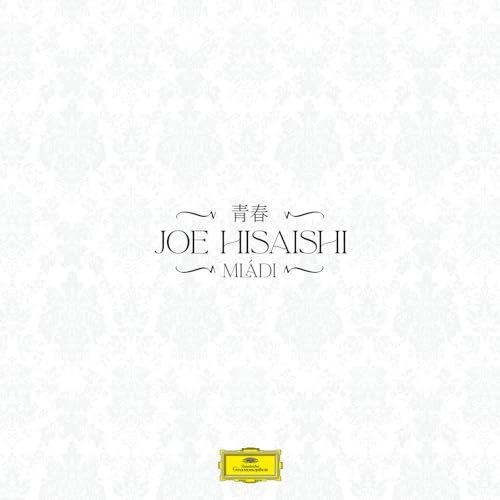



â 2024 UNIVERSAL MUSIC LLC ÂĐ 2024 UNIVERSAL MUSIC LLC, in collaboration with Deutsche Grammophon
Artist bios
Most celebrated for his alternatingly touching and dynamic orchestral film scoring, Joe Hisaishi is a prolific Japanese composer of classical works, film scores, and experimental electronic and animation music who is best known for his beloved collaborations with Studio Ghibli animation director Hayao Miyazaki on classics films such as My Neighbor Totoro, Kiki's Delivery Service, Princess Mononoke, Spirited Away, and Howl's Moving Castle.
Born Mamoru Fujisawa in Nakano, Japan, Hisaishi began studying the violin at age five and went on to major in music composition at the Kunitachi College of Music. He released his first album in 1981. Titled Mkwaju, it was written for percussion ensemble with keyboard and computer programming. That was followed in 1982 by Information, credited to Hisaishi and his oft-used pseudonym for collaborators, Wonder City Orchestra. 1983 marked his first film score and first collaboration with Miyazaki, on 1984's Nausicaa of the Valley of the Wind. With moments of sentimental strings and percussive fanfare, its range heralded the dramatic emotional content of his scores to come. Hisaishi continued to write original music outside of film, releasing dozens of his electronic and classical compositions throughout the '80s, '90s, and 2000s, all the while continuing to score films and provide accompanying image albums, vocal albums, and more for anime. Highlights of his collaborations with Miyazaki include animation scores for 1988's My Neighbor Totoro, 1997's Princess Mononoke, 2001 Oscar winner for Best Animated Feature Spirited Away, 2004's Howl's Moving Castle, and 2013's The Wind Rises and The Tale of the Princess Kaguya.
Hisaishi also scored multiple films for live-action director Takeshi Kitano, including Cannes Film Festival Palme d'Or nominee Outrage, a yakuza film released in 2010. Several compilations of his classical and film music were released over his career, and while Miyazaki took a step back from feature film production in 2013, Maestro Hisaishi continued to compose film and video game scores and make appearances conducting orchestra concerts in Asia and Europe through the remainder of the 2010s.
In 2020, the compilation Dream Songs: The Essential Joe Hisaishi was issued by Decca Gold; it was quickly followed by a second Essentials volume, 2021's Songs of Hope. That same year, he also composed the soundtrack for the Chinese movie Soul Snatcher. More Ghibli-related reissues followed in 2022, and by 2023, Hisaishi had signed a deal with Deutsche Grammophon for another set pulled from the Miyazaki universe. Joining the Royal Philharmonic Orchestra, A Symphonic Celebration took selections from Ghibli classics like Spirited Away, Princess Mononoke, and Totoro and reimagined them with fresh symphonic arrangements. His sophomore release for the label, in 2024, featured his concert music, including the Symphony No. 2. ~ Marcy Donelson
The Wiener Symphoniker (Vienna Symphony Orchestra) is a mainstay in European orchestral music, having premiered works that have become standard repertoire in the orchestral world. While its older neighbor, the Wiener Philharmoniker, may get more attention, the Wiener Symphoniker has cemented its role as a world-class orchestra.
The Wiener Symphoniker was founded in 1900 as the Wiener Concertverein. The founder and first conductor of the orchestra was Ferdinand LÃķwe, who established the new orchestra to present more concerts to the citizenry and for the performance of new compositions. The orchestra's premiere concert took place at the Wiener Musikverein on October 30, 1900. LÃķwe, a student of Anton Bruckner's, led the Wiener Symphoniker in the premiere of Bruckner's ninth symphony in 1903. In 1913, the orchestra moved its performing venue to the newly opened Wiener Konzerthaus. Due to financial concerns following World War I, the orchestra merged with the Wiener TonkÞnstlerorchester in 1919. LÃķwe served as chief conductor until 1925. He was followed by Otto Gottesmann and Wilhelm FurtwÃĪngler. In 1933, the orchestra was renamed the Wiener Symphoniker. Oswald Kabasta led the orchestra from 1934-1938. Under Kabasta, the orchestra embarked on its first international tour to England and Italy. In 1938, following the invasion of Austria, the orchestra was brought under municipal control and was used for propaganda during World War II. The orchestra was disbanded in September of 1944.
Following the war, the Wiener Symphoniker was re-established in 1945 and gave its first post-war concert in September under the leadership of Hans Swarowsky and Josef Krips. Since 1946, the orchestra has taken part in and been a major sponsor of the Bregenzer Festspiele. Herbert von Karajan (1950-1960) and Wolfgang Sawallisch (1960-1970) are credited most with the revival of the Viennese sound for which the Wiener Symphoniker is known. In 1962, the Theater an der Wien reopened, and the Wiener Symphoniker has since performed there for staged productions. Since Sawallisch, the chief conductors for the orchestra have included Carlo Maria Giulini (1973-1976), Gennady Rozhdestvensky (1981-1983), and Rafael FrÞhbeck de Burgos (1991-1996). Philippe Jordan became the chief conductor in 2014, with a contract running through 2021. In 2018, the Wiener Symphoniker announced AndrÃĐs Orozco-Estrada as its next chief conductor. Orozco-Estrada is set to take the baton in 2021. Among the illustrious names who have guest conducted the orchestra are Leonard Bernstein, Zubin Mehta, and Claudio Abbado.
The Wiener Symphoniker can be heard on hundreds of albums on major labels such as Decca, Deutsche Grammophon, EMI Classics, and Orfeo, among many others. Since 2012, the orchestra has also recorded for its own Wiener Symphoniker label, on which it has recorded works by composers such as Mahler, Bruckner, and Berlioz. Under Jordan, the orchestra has recorded a full cycle of Beethoven's symphonies. The first, Symphonies Nos. 1 & 3, was released in 2017. The final two individual albums of this cycle, Symphonies Nos. 6 & 8 and Symphony No. 9, as well as the complete cycle set, were released in 2019. ~ Keith Finke
Customer reviews
How are ratings calculated?

